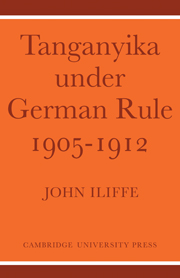Book contents
- Frontmatter
- Contents
- Preface
- Terminology
- Abbreviations
- Glossary
- Map of Tanganyika in 1912
- 1 The argument
- 2 The Maji Maji rebellion
- 3 The political context
- 4 Rechenberg and reconstruction
- 5 The European challenge
- 6 White man's country
- 7 The collapse of the local compromise
- 8 The age of improvement
- 9 The new dilemma
- Bibliography
- Index
8 - The age of improvement
Published online by Cambridge University Press: 04 August 2010
- Frontmatter
- Contents
- Preface
- Terminology
- Abbreviations
- Glossary
- Map of Tanganyika in 1912
- 1 The argument
- 2 The Maji Maji rebellion
- 3 The political context
- 4 Rechenberg and reconstruction
- 5 The European challenge
- 6 White man's country
- 7 The collapse of the local compromise
- 8 The age of improvement
- 9 The new dilemma
- Bibliography
- Index
Summary
Resistance to German invasion was defeated because it was disunited and technologically inadequate. Rebellion tried to overcome these weaknesses by the use of ideology, but failed. The diplomatic manipulation of the European rulers in order to contain their impact on established social patterns was increasingly unsuccessful. New techniques were needed, techniques which would redress the technological inequality between black and white, would provide Africans with the skills and resources which made Europeans powerful, would offer ‘effective alternatives to the spear’. As elsewhere in colonial Africa at this date, Africans in Tanganyika turned increasingly to the improvement of their societies and of themselves. ‘Improvement’ accurately describes this process. It implies evolution rather than revolution, an acceptance of the framework of colonial rule while attempting to modify its character. It implies a pre-eminent concern with local affairs. It suggests a moral seriousness and social awareness strongly apparent in the prominent figures of this period. And it implies the belief, unquestioned at this time but later to be challenged by radical nationalists, that there was no conflict between personal and social improvement, that the man who won advancement for himself thereby won a victory for his people. While the leading personality of the local compromise was the chiefly diplomat, and while the commanding figure of Maji Maji was the prophet of violence, the characteristic man of the age of improvement was the literate pastor or priest, akida or clerk, trader or teacher, the new intermediary between European and African.
- Type
- Chapter
- Information
- Tanganyika Under German Rule 1905–1912 , pp. 166 - 200Publisher: Cambridge University PressPrint publication year: 1969



